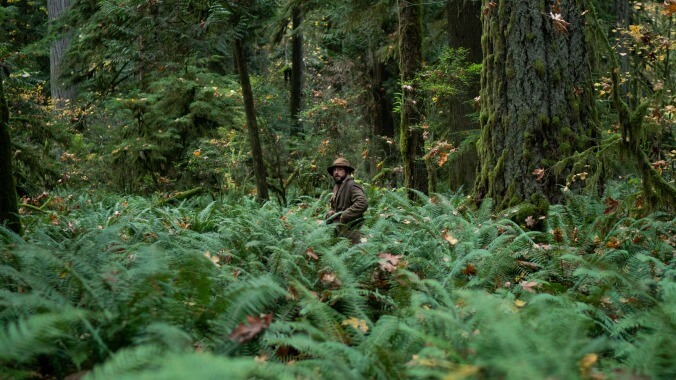We know, too, that “Cookie” Figowitz (Carol’s John Magaro) is a gentle soul from the moment, early on, that he comes across a lizard helplessly turned on its back and flips it over—one of those sharp little details of behavior that marks this as a new movie from the director of Certain Women and Wendy And Lucy. Cookie, a cook from Maryland, has come to the area along the lower reaches of the Columbia River with a party of loutish fur trappers; he’s almost comically out of place in the group, like a model of enlightenment among barbarians. But he finds a kindred spirit in King-Lu (Orion Lee), a cosmopolitan Chinese immigrant he stumbles upon in the foliage. The stranger is hiding from men even more hostile and dangerous, perhaps, than the aforementioned fur trappers. And so Cookie, in an act of kindness, feeds and shelters him.
The two meet again at The Royal West Pacific Trading Post, a rickety but bustling encampment that recalls—in its scrappy proto-town culture of intersecting personalities—the mining community of Robert Altman’s McCabe & Mrs. Miller. Reichardt envisions the place as a microcosm for the whole American experiment: a miniature land of opportunity within the larger one, drawing immigrants from all over, each chasing some kind of economic prosperity. It’s here that Cookie and King-Lu, who end up sharing a shack in the woods, devise a business plan. By night, they’ll sneak out, under cover of darkness, to milk the only cow in the Oregon Territory, left roped up and unattended on the outskirts of a massive estate. By day, they’ll supply culinary comfort to an underserved market—including the very man they’re stealing from, a British aristocrat (Toby Jones) who “tastes London” in their honey-glazed pastries. (And why wouldn’t he? They’re made from the milk of his prized ungulate!)
There isn’t much more to the plot, which comes together gradually, even leisurely over the two-hour running time. It’s based on The Half-Life, a novel by Reichardt’s regular cowriter, Jonathan Raymond. Together, the two have stripped his story down to its skeletal essence, combining characters, condensing the geographic scope (a trip to China has been excised entirely), and all but losing a parallel thread set over a century later. The results play more like one of Reichardt’s short-story adaptations, vivid and precise. Shooting close to the ground, she attunes us to a quiet and less hurried way of life. The first thing we see in First Cow is a steamboat crossing the frame, from left to right, in real time. It sets the pace—that meditative crawl that can make her movies something of an acquired taste. But this long shot also suggests, visually, the passage of lives across the stream of history.
First Cow returns Reichardt to the time, place, and claustrophobic aspect ratio of her masterpiece, Meek’s Cutoff, a tense and hypnotic Western based on the true story of a caravan that strayed disastrously off the Oregon Trail. But though there’s an element of danger here too (and plenty of echoes of the genre past, including a brawl outside a saloon and a whiz of bullets through the woods), this is a much more relaxed frontier story. At center, it’s almost a minimalist buddy comedy, built on the rapport between the soft-spoken baker and his quixotic partner. Much of the film’s laidback charm comes courtesy of its stars: Magaro lends Cookie a touching tenderness (especially during nocturnal conversations with his rather literal cash cow), while Lee gives gently amused voice to King-Lu’s curiosity, an irrepressible appreciation for the wonders of a place only half-conquered by man. (One of the film’s paradoxes is that it respects the character’s awe without quite sharing or inflating it.)
Just don’t mistake the lightness of step for a softness of philosophy. There’s a political dimension to all of Reichardt’s films, which almost invariably follow characters muscled to the margins of society. Looked at one way, First Cow is about the birth of American enterprise: a recipe calling for equal parts hard work, ambition, and a willingness to break the rules when necessary. Whether even that’s enough to claim a piece of the proverbial pie is a question that hangs over the film’s low-key vision of personal and professional partnership; the answer does arrive, before fossilizing into a warning and a legacy for every Wendy, Lucy, and hard-luck case in Reichardt’s growing ensemble of outsiders. You can connect them all to this significant chapter in history, tracing back their arcs of hardship and misfortune like tributaries on a map.










![HBO teases new Euphoria, Larry David, and much more in 2026 sizzle reel [Updated]](https://img.pastemagazine.com/wp-content/avuploads/2025/12/12100344/MixCollage-12-Dec-2025-09-56-AM-9137.jpg)






























